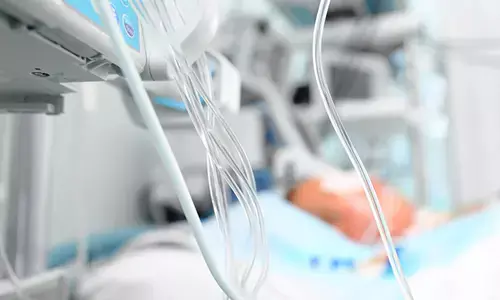- Home
- Medical news & Guidelines
- Anesthesiology
- Cardiology and CTVS
- Critical Care
- Dentistry
- Dermatology
- Diabetes and Endocrinology
- ENT
- Gastroenterology
- Medicine
- Nephrology
- Neurology
- Obstretics-Gynaecology
- Oncology
- Ophthalmology
- Orthopaedics
- Pediatrics-Neonatology
- Psychiatry
- Pulmonology
- Radiology
- Surgery
- Urology
- Laboratory Medicine
- Diet
- Nursing
- Paramedical
- Physiotherapy
- Health news
- Fact Check
- Bone Health Fact Check
- Brain Health Fact Check
- Cancer Related Fact Check
- Child Care Fact Check
- Dental and oral health fact check
- Diabetes and metabolic health fact check
- Diet and Nutrition Fact Check
- Eye and ENT Care Fact Check
- Fitness fact check
- Gut health fact check
- Heart health fact check
- Kidney health fact check
- Medical education fact check
- Men's health fact check
- Respiratory fact check
- Skin and hair care fact check
- Vaccine and Immunization fact check
- Women's health fact check
- AYUSH
- State News
- Andaman and Nicobar Islands
- Andhra Pradesh
- Arunachal Pradesh
- Assam
- Bihar
- Chandigarh
- Chattisgarh
- Dadra and Nagar Haveli
- Daman and Diu
- Delhi
- Goa
- Gujarat
- Haryana
- Himachal Pradesh
- Jammu & Kashmir
- Jharkhand
- Karnataka
- Kerala
- Ladakh
- Lakshadweep
- Madhya Pradesh
- Maharashtra
- Manipur
- Meghalaya
- Mizoram
- Nagaland
- Odisha
- Puducherry
- Punjab
- Rajasthan
- Sikkim
- Tamil Nadu
- Telangana
- Tripura
- Uttar Pradesh
- Uttrakhand
- West Bengal
- Medical Education
- Industry
Therapeutic hyperthermia improves survival in critically ill patients with sepsis, study suggests

USA: Findings from a pilot randomized trial published in Critical Care Medicine revealed that therapeutic hyperthermia is associated with lower mortality in afebrile critically ill patients with sepsis. Further study is, however, warranted to better explain the impact of temperature modulation on immune and nonimmune organ failure pathways in sepsis.
The study was conducted by Anne M Drewry, Department of Anesthesiology, Washington University School of Medicine, St. Louis, MO, and colleagues with the objective to test the hypothesis that forced-air warming of critically ill afebrile sepsis patients improves immune function compared to standard temperature management.
In a single-center, prospective, open-label, randomized controlled trial performed across one thousand two hundred-bed academic medical center, eligible patients were mechanically ventilated septic adults with: 1) a diagnosis of sepsis within 48 hours of enrollment; 2) anticipated need for mechanical ventilation of greater than 48 hours; and 3) a maximum temperature less than 38.3°C within the 24 hours prior to enrollment. A total of 56 participants were enrolled in the study.
Primary exclusion criteria included: immune-suppressing medication, immunologic diseases, and any existing condition sensitive to therapeutic hyperthermia (e.g., brain injury). Monocyte human leukocyte antigen (HLA)-DR expression was the primary outcome, secondary outcomes were CD3/CD28-induced interferon-gamma (IFN-γ) production, mortality, and 28-day hospital-free days.
The intervention was external warming using a forced-air warming blanket for 48 hours, with a goal temperature of 1.5°C above the lowest temperature documented in the previous 24 hours.
Key findings include:
- No differences were observed between the groups in HLA-DR expression (692 vs 2,002) or IFN-γ production (31 vs 69).
- Participants allocated to external warming had lower 28-day mortality (18% vs 43%; absolute risk reduction, 25%) and more 28-day hospital-free days (difference, 2.6 d).
"Participants randomized to external forced-air warming did not have a difference in IFN-γ production or HLA-DR expression," the researchers wrote. "In this pilot study, however, 28-day mortality was lower in the intervention group."
Reference:
Drewry AM, Mohr NM, Ablordeppey EA, Dalton CM, Doctor RJ, Fuller BM, Kollef MH, Hotchkiss RS. Therapeutic Hyperthermia Is Associated With Improved Survival in Afebrile Critically Ill Patients With Sepsis: A Pilot Randomized Trial. Crit Care Med. 2022 Jun 1;50(6):924-934. doi: 10.1097/CCM.0000000000005470. Epub 2022 Feb 7. PMID: 35120040; PMCID: PMC9133030.
Dr Kamal Kant Kohli-MBBS, DTCD- a chest specialist with more than 30 years of practice and a flair for writing clinical articles, Dr Kamal Kant Kohli joined Medical Dialogues as a Chief Editor of Medical News. Besides writing articles, as an editor, he proofreads and verifies all the medical content published on Medical Dialogues including those coming from journals, studies,medical conferences,guidelines etc. Email: drkohli@medicaldialogues.in. Contact no. 011-43720751


